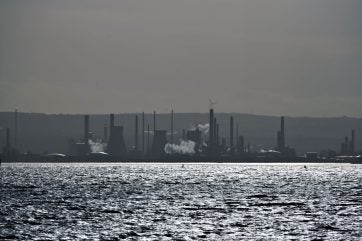
The Finnart oil pipeline that supplies Scotland’s only refinery is taking longer than expected to repair, with works estimated to continue into April, when they were set to be finished in March.
Five industry sources told Reuters that repairs began after a small oil leak was discovered in the pipeline in early July. The pipeline connects Grangemouth refinery to an oil depot on the west coast of Scotland.
The Scottish Environment Protection Agency said: “Now that the pipeline repair solution has been identified, the focus is to ensure appropriate remediation of the site. Our regulatory staff are in ongoing discussions with Petroineos and their contractors to ensure they are clear on our expectations and plans are appropriate.”
Petroineos, a joint venture between PetroChina and Ineos, whose chairman is billionaire Jim Ratcliffe, owns and operates the Finnart oil pipeline. Upon first discovering the leakage, Petroineos deployed specialists in spill containment and recovery to ensure minimal disruption to civic life in the area of Glen Fruin where the accident occurred.
Ongoing repair work on the Finnart pipeline is precluding the 150,000-barrel-per-day Grangemouth refinery from accessing crude imported from international markets. That said, the refinery is undergoing maintenance of its own and therefore has less capacity than usual to take crude at this time.
Grangemouth supplies road fuels to the Central Belt region, Scotland’s most populous area, and provides jet fuels for Scottish airports.
The incident could have knock-on effects on the global oil market. As Finnart is still out of action, oil flows will be disrupted and could impact the North Sea crude market overall, which will have wider effects as the market sets the dated Brent price benchmark.
Although Grangemouth is currently receiving no oil from Finnart, it continues to obtain flows from the Forties Pipeline System. Subsequent higher demand has pushed Forties differentials to a three-month high.




